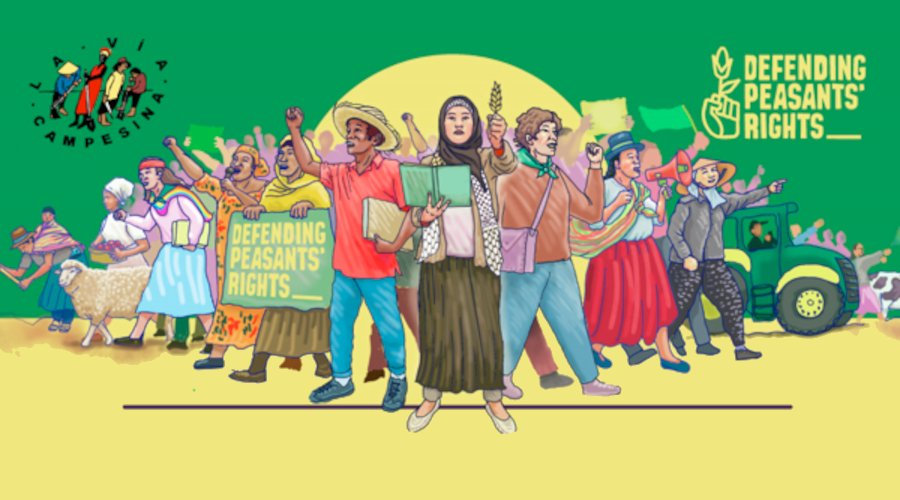Webinar | Roles and mandates of the UN Working Group on Peasants’ Rights (UNDROP)

On April 17th, the International Day of Peasant Struggles, La Via Campesina and Defending Peasants’ Rights held a webinar to explain the mandate and purposes of the new Working Group on UNDROP established within the UN Human Rights Council.
The United Nations Declaration on the Rights of Peasants and Other People Working in Rural Areas (UNDROP), adopted by the UN in 2018, is a powerful instrument to safeguard and strengthen peasants’ rights. Implementing UNDROP at national and international levels is crucial for addressing the impacts of these multidimensional crises. Since the adoption of UNDROP, efforts have been made to implement this instrument at all levels and integrate it into the agendas of existing Special Procedures and other UN bodies. For example, peasant organizations and their allies advocated for including UNDROP perspectives in the UN Decade of Family Farming, co-led by the FAO. They also worked on integrating UNDROP promotion into the agendas of existing Special Procedures related to peasants’ rights, such as the right to food, nutrition, water, sanitation, environment, freedom of association, and issues related to climate change.
However, existing thematic mandates only address peasants’ rights from specific perspectives and are insufficient to comprehensively tackle all aspects covered by UNDROP and the interconnected causes leading to violations of peasants’ and other rural peoples’ rights.
The UN Working Group was set up to facilitate a comprehensive understanding of these challenges and how peasants contribute to human rights enjoyment among rural and urban populations, advancing the realization of their rights in a holistic manner. Shalmali Guttal, Carlos Duarte, and Geneviève Savigny, members of this working group, elaborated on its rationale and purpose during the webinar.
The speakers explained that the working Group on UNDROP will play a critical role in promoting peasants’ rights globally, monitoring and reporting on States’ progress in fulfilling their obligations under UNDROP, and advising States collectively or individually on human rights implementation focusing on peasants and rural peoples.
The Working Group on UNDROP also aims to enhance the Human Rights Council’s understanding of connecting peasants’ rights realization with urgent issues such as responding to multiple crises. It will contribute to discussions from a peasant’s perspective on topics like just transition, digitalization challenges, human mobility, and migration.
To fulfill its mandate, the Working Group on UNDROP is tasked to:
- Monitor : Visit countries needing special attention in UNDROP implementation, meet local authorities, peasant movements, and supporting civil society organizations (CSOs).
- Raise Awareness: Increase public awareness about UNDROP and peasants’ rights, share lessons learned and best practices, draft public statements and reports on peasants’ rights status worldwide, and advise governments on enhancing human rights obligations, particularly regarding peasants’ rights.
- Advise: Provide technical cooperation advice at national, regional, and international levels to develop policies, programs, and institutions strengthening human rights realization for peasants and rural people.
- Access to Justice: Formulate recommendations based on reports and claims by peasant and rural organizations and CSOs to address peasants’ rights violations, improve implementation, and promote policies and legislation protecting peasants’ rights.
- International Cooperation and Mainstreaming Peasants’ Rights Issues: Contribute to the development of international human rights standards that strengthen States’ compliance with their existing human rights obligations, from the perspective of peasants and other rural people. Furthermore, a Special procedure serves as a forum for discussion and cooperation between countries, for exchanging good practices, and as a space to coordinate ideas and proposals on implementation across countries. At the same time, the space will allow direct dialogue and articulation between countries’ representatives, the rights holders (peasants and other rural communities), and other CSOs working on the promotion of UNDROP.
For more details visit the website of Defending Peasants’ Rights.
This post is also available in Español.
